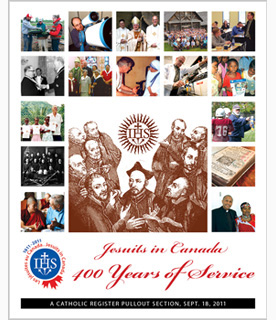Fr. Platt built several Toronto parishes
TORONTO - Fr. Edwin Platt, a well-known priest who served throughout his hometown of Toronto, died Sept. 17. He succumbed to the stroke that had felled him while he was saying Mass at Corpus Christi parish.
Fr. Platt was 89 and was in his 62nd year as a priest.
Fr. Platt had returned in his later years to the east end where he grew up. He was educated at St. John’s and Corpus Christi Schools before moving on to St. Michael’s College School. He entered St. Augustine’s Seminary and was ordained a priest in 1948.
Deacon Ted MacDonnell was an OPP detective
BARRIE, ONT - Depending on who he was with, Deacon Ted MacDonnell was affectionately known as detective, sergeant, deacon, pastor, professor, Teddy, dad or papa.
He was a man of many names and even more friends, someone who always had time for people, whether it was in his role as an OPP detective or a deacon in the Church. Above all, though, he was a husband, father of two daughters and grandfather of five children whom he baptized.
“Everyone he came in contact with remembered him warmly and with a genuine smile because dad simply cared,” said his youngest daughter, Janet Small.
Weekly Crossword #1 - Oct 2nd 2011
See how you get on with the first crossword in our new series. Select "file > print" in your browser to print off your own copy.
And don't worry, we'll be publishing the solution next week! [update - find the solution to puzzle #1 here]
More information: Register launches a wordy new feature this week 
Across1. He loves, to Livy
|
Down1. Help a felon
|
Designed by: Bob Carson
Register launches a wordy new feature this week
The Catholic Register is launching a new feature this week. Here’s a clue: What’s a 15-letter term for cruciverbalist?
If you answered a person who creates crossword puzzles you are absolutely correct — and can go to Page 26 to try out our new weekly feature, a Catholic crossword puzzle.
The puzzles are designed to be fun and educational but not too difficult so they can be enjoyed by a broad cross section of readers. Each week will offer a different Church-based theme, such as Canadian saints, religious orders or holy days.
- Click here to try out the first crossword. Check back next week for the solution.
Jesuits in Canada - Browse print version
Jesuits in Canada - 400 Years of Service
Friday, 16 September 2011
The Catholic Register is proud to honour the 400th anniversary of the Jesuits arrival in Canada with this 18 part special feature.
There are two ways to read the articles.
You can view the articles in the embedded reader below as they were printed in the newspaper . Click the "Expand" button in the centre of the player to go full-screen for the best reader experience. You can then zoom in on specific pages with the magnifying glass button or by using the scroll wheel on your mouse. Click to the side to navigate through the pages and press the ESC key on your keyboard to exit.
You can also enjoy the articles on catholicregister.org. Just use the 18 links below the reader to browse through the stories.
Jean de Brébeuf’s rules on interacting with the Hurons
The journey from theological debate at the University of Paris to a Huron village on the shores of Georgian Bay in the 17th century was long — physically and psychologically. St. Jean de Brebeuf’s “Instructions for the Fathers of our Society Who Shall Be Sent to the Hurons” hints at the cultural chasm Jesuits were prepared to cross.
In 1636 Brebeuf wrote:
You must have a sincere affection for the Huron — looking upon them as ransomed by the blood of the Son of God, and as our brethren with whom we are to pass the rest of our lives.
To conciliate the Huron, you must be careful never to make them wait for you in embarking.
Tuck up your gowns so that they will not get wet and so that you will not carry either water or sand into the canoe.
Be careful not to annoy anyone in the canoe with your hat; it would be better to take your night cap.
You must provide yourself with a tinder box or with a burning mirror, or with both, to furnish them fire in the daytime to light their pipes, and in the evening when they have to encamp; these little services win their hearts.
Each one should be provided with half a gross of awls, two or three dozen little knives called jambettes... a hundred fish hooks, with some beads of plain or coloured glass, which to buy fish or other articles when the tribes meet each other...
You should try to eat their sagamite or salmagundi in the way they prepare it, although it may be dirty, half-cooked and very tasteless. As to the other numerous things which may be unpleasant, they must be endured for the love of God, without saying anything or appearing to notice them. It is well at first to take everything they offer, although you may not be able to eat it at all; for, when one becomes somewhat accustomed to it, there is not too much.
You must try to be, and to appear, always cheerful. You must so conduct yourself as not to be at all troublesome to even one of these Hurons.
Do not undertake anything unless you desire to continue it; for example, do not begin to paddle unless you are inclined to continue paddling.
Finally, understand that the Huron will retain the same opinion of you in their country that they will have formed on the way; and one who has passed for an irritable and troublesome person will have considerable difficulty afterwards in removing this opinion.
(Courtesy of Huronia Historical Parks, abridged from the Jesuit Relations, Vol. XII, 1637. Republished by R.G. Thwaites, N.Y.: Pageant Books, 1959 Pg. 117-123.)
Wherever they went, Jesuits embraced local ways
When Frs. Pierre Biard and Ennemond Massé arrived in Canada in 1611 their religious order was a relative infant. In 1611, the Jesuits had only been in existence 71 years, compared to the Benedictines who were more than 1,000 years old, or the Dominicans and Franciscans who were each about 400 years old.
But the Jesuits wasted no time in taking the Gospel to the frontiers. Just one year after the Society of Jesus was formally approved by Pope Paul III in 1540, St. Francis Xavier left for the far east. And by the time the Jesuits came to Canada, they had already established missions in the far east, Africa and Latin America.
St. Francis Xavier’s incredible success in India and Indonesia, heroic efforts in Japan and doomed attempt to reach China — all in the space of eight years — established a Jesuit pattern of absolute commitment to spreading the Gospel.
Martin Royackers was first English Canadian Jesuit killed in service
In Jamaica they called Fr. Martin Royackers a “roots man.” Around the world, Jesuits and their friends call him a martyr.
He was the first English Canadian Jesuit to be killed on the job.
Royackers was born and died in farming communities. Born Nov. 14, 1959 near Strathroy, Ont., he was killed outside St. Theresa’s parish church in Annotto Bay, Jamaica, June 20, 2001.
Three martyred at China mission
Fr. Prosper Bernard, Fr. Alphonse Dubé and Fr. Armand Lalonde were three of more than 100 Quebec Jesuits who became missionaries in China between 1918 and 1954. They are also three of more than 300 Jesuits worldwide martyred in the 20th century.
The involvement of Quebec Jesuits in China started with an invitation from France’s Jesuits. A few helping hands were sent from Quebec to Shanghai. But their numbers quickly grew as Quebeckers embraced the mission to China. Jesuit missionaries were supported by Quebeckers through the Holy Childhood Association and parish-based missionary weeks.
“There was incredible international awareness (in Quebec),” said Jesuit historian Fr. John Meehan of Campion College in Regina.
The formation process for a Jesuit is laborious, lengthy — up to 15 years
Jesuit formation is famously tough, thorough and long. There are distinct stages to Jesuit formation, which can take 15 years or more to complete.
While there is no such thing as a postulancy prior to the novitiate for Jesuits, you can’t just walk into a novitiate. Once a young man expresses an interest in trying out Jesuit life he will usually be assigned a spiritual director. It may be months, a year or even longer before he is admitted to the novitiate.
As in most Catholic religious orders, Jesuits start out as novices. While novices in most other orders take vows after one year, the Jesuit novitiate lasts two years. After first vows, a Jesuit is assigned to “first studies.” Classically, these consisted of Greek and Latin literature. These days they are likely to include modern languages, philosophy and other studies that may lead to a bachelors or masters degree, depending on the education the young Jesuit had before entering the order. This period usually lasts two years.



